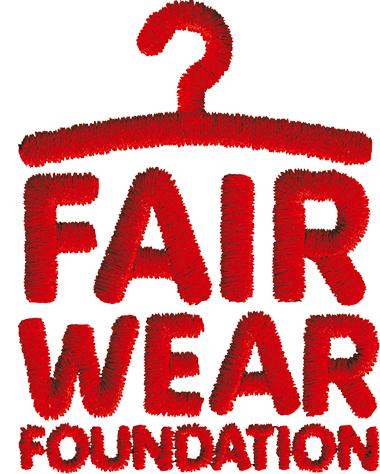View the FWF Financial Report for 2018, which includes our independent auditor’s report here.
DownloadSwiss Post Social Report 2018
Fair Wear Foundation members are required to hand in an annual social report. Companies’ social reports are part of FWF’s requirements on brand transparency. FWF collects and publishes the reports, but does not verify their content before publishing them. The quality of the social reports is checked and reported on through the annual brand performance checks.
DownloadWorkplace Education Programme 2019
To support brands and factories in fulfilling their basic responsibility to inform workers about their rights and access to grievance systems, FWF has designed several modules for different countries.
This document provides more information about the availability of training for each country.
DownloadManroof social report 2018
Manroof Social Report 2018
FWF members are required to hand in an annual social report. Companies’ social reports are part of FWF’s requirements on brand transparency. FWF collects and publishes the reports, but does not verify their content before publishing them. The quality of the social reports is checked and reported on through the annual brand performance checks.
DownloadManroof social report 2016
Manroof Social Report 2016
FWF members are required to hand in an annual social report. Companies’ social reports are part of FWF’s requirements on brand transparency. FWF collects and publishes the reports, but does not verify their content before publishing them. The quality of the social reports is checked and reported on through the annual brand performance checks.
DownloadIndia Country Study 2019
This country study draws on consultations with key stakeholders across India’s textile and garment sector, Fair Wear Foundation (FWF) audits and complaints received via the FWF complaints mechanism to detail the unacceptable working conditions faced by many textile and garment workers in India. The study focused on the working conditions of textile and garment workers in the production hubs of Delhi National Capital Region (NCR), Bangalore and Tirupur. From November to December 2018 about 20 stakeholders were consulted in the three regional hubs. Stakeholders largely comprised of NGOs and research centres and few trade unions, business associations, public authority and international organisation. The full list of stakeholders is available in Annex III.
The textile and garment industry is the third largest employer in India, with 45 million workers employed in the sector. While the growth rate of ready-made garments for export has slowed down, the domestic market continues to expand considerably. Several industry-wide trends are shaping working conditions in the textile and garment industry; namely, the increased employment of contract workers and inter-state migrants and the displacement of factories to contain production costs.
DownloadIndonesia Homeworkers Report
Home workers are part of the supply chains in many of Indonesia’s production sectors. While no hard data is available, home workers are a common sight in the Indonesian ready-made-garment sector. Such workers are mainly working for factories producing for the domestic market; however, international brands can come across suppliers that have home workers produce their garments. Fair Wear Foundation (FWF) requires that all members con-duct human rights due diligence in their supply chains. Identifying production locations, including the use of home workers is part of FWF members’ responsibility. FWF’s Guidance on home-based work specifies what FWF member brands can – and should – do to identify, prevent and remediate violations of the FWF Code of Labour Practices towards home workers.
This study highlights the working conditions of home workers in the Indonesian state of Bali. Balinese home workers have more favourable working conditions than home workers in other Indonesian states such as Java. Based on a 2015 ILO study in Java, Balinese and Javanese home workers’ working conditions differ significantly, with – Balinese home workers having more favourable circumstances. For instance, Balinese home workers typically receive orders directly from factories without intermediaries and receive the same piece – or even a bit higher – as factory workers. Another characteristic is that the factories are small and medium-sized, often run as a family business where work relationships are felt as family relations. Additionally, Bali, with its Hindu religion, was found to put significant emphasis on harmonious relations between employers and employees.
Despite these positive changes, Balinese home workers’ situation is precarious and serious issues exist that need to be addressed. Notably, a lack of social security (health care insurance and pension coverage) means home workers have little financial protection from work-related accidents. This is exacerbated by the fact that home workers rarely earn the official minimum wage for Bali province and job orders do not come regularly, causing earnings to fluctuate widely. These issues are partly caused by home workers’ insufficient knowledge of the rights that they are entitled to.
DownloadExpresso Performance Check 2019
Expresso Fashion has met most of FWF’s performance requirements. Its monitoring threshold of 94% is an improvement compared to last year. To achieve this monitoring percentage, Expresso used FWF audits conducted at its production locations and continued to use external audit reports to address labour conditions. The monitoring percentage, combined with a benchmark score of 60, means that FWF has awarded Expresso Fashion the ‘Good’ rating.
Expresso started consolidating its supply chain in 2016, which led to a critical evaluation of the required production locations. This process included an integration of its purchasing and CSR efforts, not just within the specific brand but also within its holding company, FNG Group. In 2018, the company was able to present a more manageable supply chain and a sourcing strategy in which CSR is a deciding factor.
Looking at Expresso’s supplier base there is a split between Eastern European production locations and production locations in Turkey, China, and India. This split influences the company’s ability to follow up on CAPs and more generally address human rights issues. The former are smaller production locations, within which Expresso has leverage and good working relationships. Audits conducted at these production locations reveal limited findings and CAP follow up is quick and effective. On the other hand, the brand sources from a number of production locations in Turkey, China, and India. In these locations, the audits reveal many more findings and CAP follow up is slow and difficult. This is despite the fact that the brand has local representatives in these countries that regularly visit the production locations in order to follow up.
Although living wage has been on Expresso’s radar for a few years now, the brand has not been able to show specific results. Fair Wear Foundation requires the company to ensure it knows how buying prices relate to wages and use this knowledge to contribute to higher wages in different production locations. The company is encouraged to provide buyers (or other employees involved in price negotiations with suppliers) training on cost breakdowns.
When visiting production locations, Expresso staff share information with workers to increase their awareness of FWF Code of Labour Practices and the complaints mechanism. However, the company has not yet organised any training to reinforce this or training that supports transformative processes related to human rights. Fair Wear Foundation expects Expresso to put more effort into training workers and management at production locations to achieve progress on human rights violations.
DownloadFWF membership application form
Please fill out this form if you are applying for Fair Wear Foundation membership. For further information, see our Membership page.
DownloadProposed ILO Standard: Convention and Recommendation on Violence and Harassment Against Women and Men in the World of Work
Violence and harassment —especially against women—in the world of work is a prevalent and persistent issue, deeply rooted in unequal structural norms and practices. It is a global issue that affects all occupations and sectors. It is particularly widespread in the garment industry, which employs a high number of women, often in lower- paid, lower-power positions.
ILO definition of violence in the service sector: ‘Any action, incident or behaviour that departs from reasonable conduct in which a person is assaulted, threatened, harmed, or injured in the course of, or as a direct result of, his or her work’
FWF have developed a guide that outlines clear actions brands can take to tackle gender-based violence, and help the ratification of the global ILO Convention on Violence and Harassment in the World of Work.
Download






